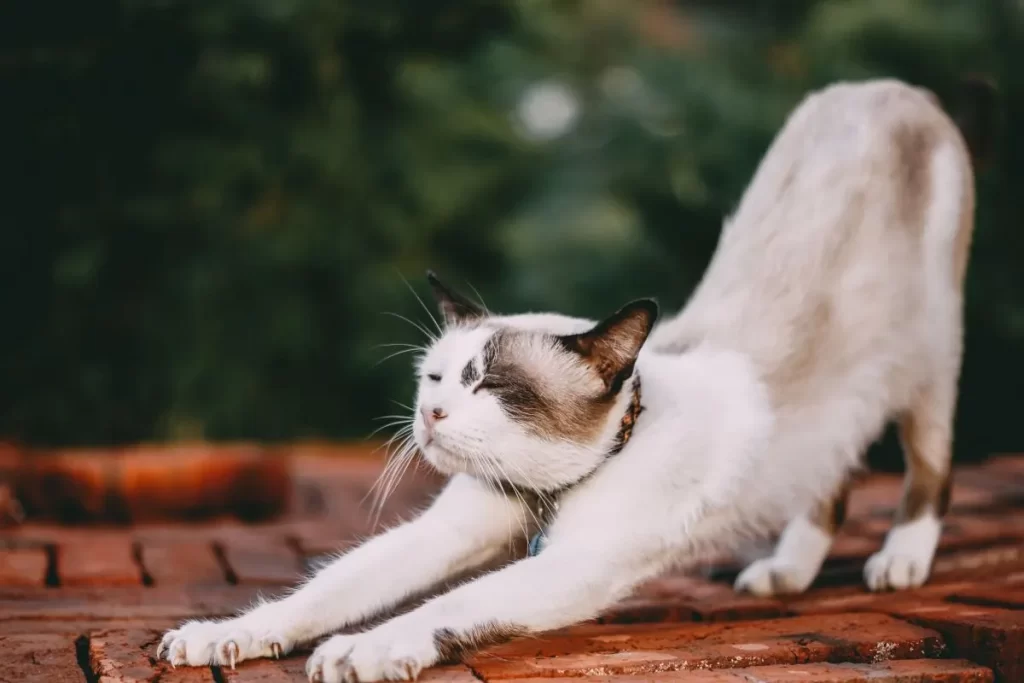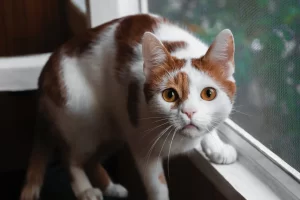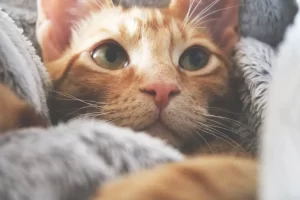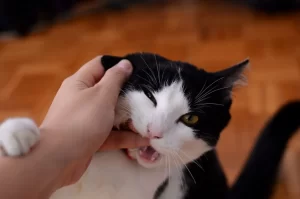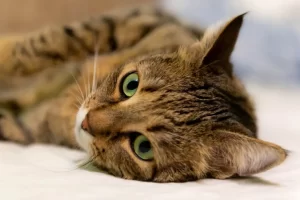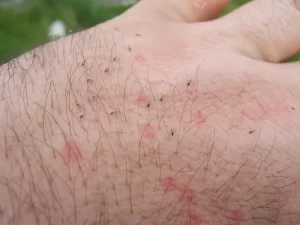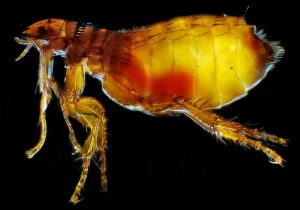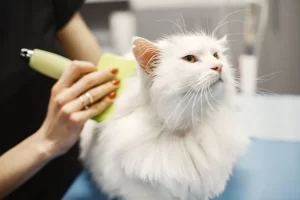Hyperthyroidism is a common condition in older cats that occurs when the thyroid gland produces too much thyroid hormone. While conventional treatments, such as medication and surgery, are available, many cat owners are turning to natural remedies for hyperthyroidism in cats as an alternative or complementary approach. Natural remedies, such as herbal remedies, nutritional supplements, acupuncture, and homeopathy, can help manage hyperthyroidism symptoms and promote overall health and well-being in cats. In this article, we will explore the various natural remedies available for hyperthyroidism in cats and provide tips for their safe and effective use.
Table of Contents
ToggleWhat is hyperthyroidism in cats?
Hyperthyroidism in cats is a common endocrine disorder that occurs when the thyroid gland, located in the neck, produces too much thyroid hormone. The thyroid hormone is essential for regulating metabolism in the body. When there is an excess of thyroid hormone, it can lead to a wide range of symptoms and health problems for the cat. Hyperthyroidism in cats is typically seen in cats that are middle-aged or older, and it is more common in cats over 10 years of age. It can occur in both male and female cats, and it is more common in certain breeds such as Siamese and Himalayan cats. Hyperthyroidism is a serious condition that requires veterinary care and management.
Main causes of hyperthyroidism in cats
The exact cause of hyperthyroidism in cats is not fully understood, but there are a few theories about what may contribute to the development of the condition. Here are some of the potential causes:
- Diet: Some researchers believe that a diet that is high in iodine or certain types of fish may contribute to the development of hyperthyroidism in cats. However, there is still some debate about whether diet is a significant factor.
- Genetics: There may be a genetic predisposition to hyperthyroidism in certain cat breeds. Studies have shown that Siamese and Himalayan cats may be more prone to developing hyperthyroidism.
- Environmental factors: Exposure to certain chemicals or toxins in the environment, such as flame retardants or pesticides, may contribute to the development of hyperthyroidism in cats.
- Age: Hyperthyroidism is more commonly seen in cats over the age of 10, and it is rare in cats under the age of 8.
- Hormonal imbalances: Some researchers believe that hormonal imbalances, particularly changes in the levels of sex hormones, may contribute to the development of hyperthyroidism in cats.
- Benign thyroid tumors: The vast majority of hyperthyroid cases in cats are caused by benign tumors on the thyroid gland. These tumors are typically non-cancerous, but they can cause the gland to produce excess thyroid hormone.
Note that the exact cause of hyperthyroidism in cats is not fully understood and it may be a combination of factors that lead to the development of the condition. If you suspect your cat may have hyperthyroidism, it’s important to consult with a veterinarian for proper diagnosis and treatment.
Symptoms of hyperthyroidism in cats
Hyperthyroidism in cats can cause a variety of symptoms, which can range from mild to severe. Here are some of the most common symptoms of hyperthyroidism in cats:
- Increased appetite: Hyperthyroidism can cause an increase in appetite, which can lead to weight loss despite increased food consumption.
- Weight loss: Despite an increased appetite, cats with hyperthyroidism may experience weight loss due to increased metabolism.
- Increased thirst and urination: Hyperthyroidism can cause increased thirst and urination as the body tries to flush out excess thyroid hormones.
- Vomiting and diarrhea: Some cats with hyperthyroidism may experience vomiting and diarrhea, which can be caused by increased metabolic activity and changes in the digestive system.
- Poor coat condition: Hyperthyroidism can cause changes in the skin and coat, including dull or greasy fur, matting, and hair loss.
- Restlessness and hyperactivity: Cats with hyperthyroidism may become more active and restless than usual due to increased metabolism.
- Aggression and irritability: Some cats with hyperthyroidism may become more aggressive or irritable due to changes in hormone levels.
- Increased heart rate: Hyperthyroidism can cause an increased heart rate, which can be detected during a physical examination.
- Heart problems: Long-term untreated hyperthyroidism can lead to heart problems such as hypertension, heart murmur, and heart failure.
- Respiratory distress: In severe cases of hyperthyroidism, cats may experience difficulty breathing due to fluid accumulation in the lungs.
If you notice any of these symptoms in your cat, it’s important to consult with a veterinarian for proper diagnosis and treatment. Hyperthyroidism is a serious condition that can have long-term health effects if left untreated.
Conventional treatments for hyperthyroidism in cats
There are several conventional treatments for hyperthyroidism in cats that are commonly used by veterinarians. Here is a list of the most common treatment options, along with details on each option:
- Medication: Antithyroid medication such as methimazole is commonly used to manage hyperthyroidism in cats. This medication works by blocking the production of thyroid hormones. Medication is often the first line of treatment and can be effective in controlling symptoms. However, cats must be monitored regularly for side effects and blood tests must be done to ensure proper dosage.
- Radioactive iodine therapy: Radioactive iodine therapy is a highly effective treatment for hyperthyroidism in cats. The treatment involves injecting a small amount of radioactive iodine into the cat’s bloodstream. The iodine is taken up by the overactive thyroid cells and destroys them. The treatment is non-invasive and only requires a short hospital stay. However, it can be expensive and there are some risks associated with the use of radioactive material.
- Surgery: Surgical removal of the thyroid gland is another treatment option for hyperthyroidism in cats. This treatment is usually reserved for cats who are not good candidates for other treatments. Surgery requires general anesthesia and carries some risk of complications, such as damage to the parathyroid glands, which are located near the thyroid gland.
- Diet modification: Some veterinarians may recommend a special diet for cats with hyperthyroidism. These diets are low in iodine and may help to manage symptoms in some cases. However, diet modification alone is not considered a primary treatment option.
Potential side effects of conventional treatments
While conventional treatments for hyperthyroidism in cats can be effective in managing symptoms, they can also carry some potential side effects. Here is a list of the most common side effects associated with each treatment option, along with details on each item:
Medication:
- Vomiting and diarrhea: Some cats may experience digestive upset when first starting antithyroid medication. This side effect typically resolves as the cat adjusts to the medication.
- Lethargy: In some cases, cats may experience lethargy or decreased activity when taking antithyroid medication. This may be a sign that the dosage is too high and should be adjusted.
- Skin irritation: Rarely, cats may develop skin irritation or an allergic reaction to antithyroid medication.
Radioactive iodine therapy:
- Hypothyroidism: In some cases, radioactive iodine therapy can result in an underactive thyroid gland (hypothyroidism). This may require ongoing medication to manage.
- Radiation exposure: The use of radioactive material carries some risks of radiation exposure to both the cat and veterinary staff.
- Facility requirements: Radioactive iodine therapy requires specialized facilities to administer the treatment, which may not be available in all areas.
Surgery:
- Hypothyroidism: Surgical removal of the thyroid gland can also result in an underactive thyroid gland (hypothyroidism).
- Anesthesia risks: Any surgical procedure carries some risk of complications related to anesthesia.
- Damage to parathyroid glands: The parathyroid glands are located near the thyroid gland and can be damaged during surgery, leading to complications such as low blood calcium levels.
Diet modification:
- Nutrient deficiencies: Special diets for cats with hyperthyroidism are typically low in iodine, which can result in deficiencies of other important nutrients if not properly balanced.
- Lack of efficacy: Diet modification alone is not always effective in managing hyperthyroidism and may need to be combined with other treatment options.
It’s important to discuss potential side effects with your veterinarian and monitor your cat closely for any changes or complications during treatment. In some cases, side effects can be managed by adjusting treatment dosages or using additional medications to manage symptoms.
Natural remedies for hyperthyroidism in cats
Natural remedies for hyperthyroidism in cats can be used alongside conventional treatments, or as the primary treatment in mild cases. Here are the main categories of natural remedies and a brief explanation of each:
- Herbal Remedies: Certain herbs, such as Bugleweed and Lemon Balm, are believed to have a mild inhibitory effect on thyroid hormone production. Ashwagandha is an adaptogenic herb that supports the endocrine system and reduces stress levels.
- Nutritional Supplements: L-carnitine and Omega-3 fatty acids are commonly used supplements for hyperthyroidism in cats. L-carnitine helps to reduce hyperthyroid symptoms and improve overall health, while Omega-3 fatty acids help to reduce inflammation and support healthy immune function. Vitamin B-complex is also recommended to support adrenal glands and reduce stress levels.
- Acupuncture: Acupuncture helps to reduce stress and support healthy immune function in cats with hyperthyroidism. It improves circulation and reduces inflammation.
- Homeopathy: Homeopathic remedies are prescribed based on a cat’s specific symptoms and overall health. Common remedies include Lycopodium, Calcarea carbonica, and Natrum muriaticum.
- Dietary Change: Special diets for cats with hyperthyroidism are low in iodine, which can help to reduce thyroid hormone production. These diets also contain high-quality protein and essential fatty acids.
- Managing Stress: Stress management techniques such as massage, environmental enrichment, and playtime can help to reduce stress levels in cats with hyperthyroidism. Chronic stress can exacerbate hyperthyroid symptoms and impact overall health.
Discuss the use of natural remedies with your veterinarian and monitor your cat closely for any changes or complications during treatment.
Herbal remedies for hyperthyroidism in cats
Here are some common herbal remedies for hyperthyroidism in cats, along with their benefits and instructions for use:
- Bugleweed (Lycopus virginicus): This herb is believed to inhibit the production of thyroid hormones. It can be given in the form of a tincture or tea. Dosage instructions should be obtained from a veterinarian or a qualified herbalist. Bugleweed is often used in combination with other herbs, such as Lemon Balm.
- Lemon Balm (Melissa officinalis): Lemon Balm has a mild inhibitory effect on thyroid hormone production. It can be given in the form of a tea or tincture. Dosage instructions should be obtained from a veterinarian or a qualified herbalist.
- Ashwagandha (Withania somnifera): This adaptogenic herb helps to support the endocrine system and reduce stress levels. It has been shown to have a positive effect on thyroid function in some studies. It can be given in the form of a tincture or powder. Dosage instructions should be obtained from a veterinarian or a qualified herbalist.
- Guggul (Commiphora mukul): This herb has anti-inflammatory properties and has been shown to reduce the production of thyroid hormones. It can be given in the form of a powder or tincture. Dosage instructions should be obtained from a veterinarian or a qualified herbalist.
You should remember that herbal remedies should be used with caution, as some can interact with conventional treatments or have side effects of their own.
Managing hyperthyroidism in cats: The role of nutritional supplements
Here are some common nutritional supplements for hyperthyroidism in cats, along with their benefits and instructions for use:
- L-carnitine: This amino acid helps to reduce hyperthyroid symptoms and improve overall health. It also supports cardiac function and reduces oxidative stress. L-carnitine can be given in the form of a capsule or liquid. Dosage instructions should be obtained from a veterinarian.
- Omega-3 fatty acids: These essential fatty acids help to reduce inflammation and support healthy immune function. They can also help to support cardiac function and reduce oxidative stress. Omega-3 fatty acids can be given in the form of a capsule or liquid. Dosage instructions should be obtained from a veterinarian.
- Vitamin B-complex: This group of vitamins supports adrenal glands and reduces stress levels. Stress can exacerbate hyperthyroid symptoms and impact overall health. Vitamin B-complex can be given in the form of a capsule or liquid. Dosage instructions should be obtained from a veterinarian.
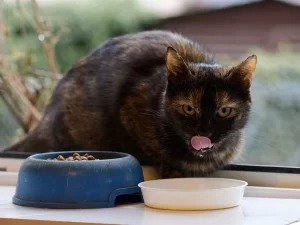
Dietary management of hyperthyroidism in cats
Dietary changes can play an important role in managing hyperthyroidism in cats. Here are some options for dietary changes that can help:
- Low-iodine diet: Iodine is essential for thyroid hormone production, so reducing iodine intake can help to decrease the production of thyroid hormones. A low-iodine diet can be achieved by feeding a commercial prescription diet or by preparing homemade meals using low-iodine ingredients. It is important to consult with a veterinarian or a veterinary nutritionist to ensure that the diet is balanced and provides all necessary nutrients.
- Limited ingredient diet: Some cats may have food sensitivities that can exacerbate hyperthyroid symptoms. A limited ingredient diet can help to identify and eliminate problematic ingredients. These diets contain a limited number of ingredients, making it easier to pinpoint which ingredients may be causing issues.
- Grain-free diet: Some cats may have sensitivities to grains, which can cause inflammation and exacerbate hyperthyroid symptoms. A grain-free diet can help to reduce inflammation and improve overall health.
- Increased protein diet: High protein diets can help to support muscle mass, which can be lost as a result of hyperthyroidism. Protein also helps to support immune function and maintain healthy skin and coat.
Keep in mind that any dietary changes should be made gradually over the course of several days to avoid digestive upset.
Homeopathic remedies for managing hyperthyroidism in cats
Homeopathy is a holistic treatment approach that uses natural substances to stimulate the body’s natural healing abilities. Here are some options for homeopathic remedies that may be used to help manage hyperthyroidism in cats:
- Iodum: This remedy is made from iodine and is commonly used to treat hyperthyroidism. It may help to reduce symptoms such as weight loss, increased appetite, and nervousness.
- Lycopus: This remedy is made from bugleweed and may help to regulate the thyroid gland and reduce the production of thyroid hormones. It may also help to reduce symptoms such as heart palpitations and anxiety.
- Natrum muriaticum: This remedy is made from sodium chloride and may help to reduce hyperthyroid symptoms such as thirst, restlessness, and weight loss.
- Thyroidinum: This remedy is made from thyroid gland extract and may help to balance thyroid function and reduce symptoms such as nervousness, weakness, and weight loss.
It is important to note that homeopathic remedies should only be used under the guidance of a qualified homeopathic practitioner. The practitioner will evaluate the cat’s individual symptoms and determine which remedies are appropriate. Homeopathic remedies are typically given in the form of pellets or drops, and the dosages and frequencies may vary depending on the individual case.
Acupuncture and acupressure for hyperthyroidism in cats
Acupuncture and acupressure are holistic treatment approaches that can help to manage the symptoms of hyperthyroidism in cats. These practices involve stimulating specific points on the body to promote healing and balance. Here are some ways that acupuncture and acupressure may be used to help manage hyperthyroidism in cats:
- Calming the nervous system: Acupuncture and acupressure can help to calm the nervous system and reduce anxiety and stress in cats with hyperthyroidism. This can help to reduce symptoms such as restlessness and hyperactivity.
- Regulating thyroid function: Acupuncture and acupressure can help to regulate the function of the thyroid gland and reduce the production of thyroid hormones. This can help to reduce symptoms such as weight loss and increased appetite.
- Stimulating immune function: Acupuncture and acupressure can help to stimulate the immune system, which can be weakened in cats with hyperthyroidism. This can help to improve overall health and reduce the risk of complications.
Acupuncture involves the insertion of thin needles into specific points on the body, while acupressure involves applying pressure to these points with the fingers. Both practices are typically performed by a qualified practitioner and may be used in conjunction with other holistic treatments, such as herbal remedies and nutritional supplements. The number and frequency of treatments may vary depending on the individual case and the severity of the condition.
Relaxation techniques for hyperthyroidism in cats
Massage and other relaxation techniques can be beneficial for cats with hyperthyroidism, as stress can worsen the condition and its symptoms. Here are some ways that massage and other relaxation techniques can be used to manage stress in cats with hyperthyroidism:
- Massage: Massaging your cat can help to relax their muscles and promote overall relaxation. This can be particularly beneficial for cats with hyperthyroidism who may be experiencing muscle weakness or tension. Gentle strokes and kneading can help to improve circulation and reduce stress.
- Aromatherapy: The use of essential oils, such as lavender or chamomile, can help to promote relaxation in cats with hyperthyroidism. A few drops of essential oil can be added to a diffuser or mixed with carrier oil and applied to the cat’s fur.
- Music therapy: Soothing music can help to calm cats with hyperthyroidism and reduce stress. Soft classical music or nature sounds can be played in the background to create a calming environment.
- Environmental enrichment: Providing your cat with plenty of toys and activities can help to reduce stress and promote relaxation. Puzzle toys and scratching posts can help to keep your cat entertained and mentally stimulated.
Best practices for using natural remedies for hyperthyroidism in cats
Here are some best practices to keep in mind when using natural remedies for hyperthyroidism in cats:
- Consult with your veterinarian: Before starting any natural remedies, it is important to consult with your veterinarian to make sure they are safe and appropriate for your cat’s specific needs and health conditions. Read more on How often should I take my cat to the vet?
- Start slowly: When introducing a new natural remedy, start with a small dose and monitor your cat’s response. Gradually increase the dose if necessary.
- Use high-quality products: Make sure to use high-quality natural remedies that are specifically formulated for cats.
- Follow instructions carefully: Always follow the instructions on the product label carefully, including dosage and frequency of administration.
- Monitor progress: Regularly monitor your cat’s progress and thyroid hormone levels to ensure that the treatment is effective and not causing any negative side effects.
- Be patient: Natural remedies may take time to show their full effects, so be patient and consistent with the treatment.
- Consider complementary therapies: Natural remedies can be used in conjunction with other complementary therapies, such as acupuncture or massage, to help manage hyperthyroidism and promote overall health.
Overall, natural remedies can be an effective and safe way to manage hyperthyroidism in cats, but it is important to use them carefully and in conjunction with the advice of a veterinarian.
Potential complications if left untreated?
If left untreated, hyperthyroidism in cats can lead to a number of potential complications, including:
- Heart disease: Hyperthyroidism can cause an increased heart rate and high blood pressure, which can put a strain on the heart and lead to heart disease.
- Kidney disease: High levels of thyroid hormone can cause damage to the kidneys over time.
- Weight loss and muscle wasting: Cats with hyperthyroidism often experience weight loss and muscle wasting, which can lead to weakness and lethargy.
- Gastrointestinal problems: Hyperthyroidism can cause digestive issues such as vomiting and diarrhea.
The survival rates for cats with hyperthyroidism depend on the severity of the condition and the age and overall health of the cat. With appropriate treatment, most cats with hyperthyroidism can live for several years with a good quality of life. However, if left untreated, hyperthyroidism can be life-threatening and significantly reduce a cat’s lifespan.
Tips for preventing hyperthyroidism in cats
The exact cause of hyperthyroidism in cats is still unknown, so there are no guaranteed ways to prevent the condition. However, there are some tips that may help reduce the risk of developing hyperthyroidism in cats:
- Regular veterinary check-ups: Bring your cat to the vet for regular check-ups to monitor their thyroid hormone levels and overall health.
- Balanced diet: Feed your cat a balanced, high-quality diet to maintain their overall health and reduce the risk of developing obesity or other health issues.
- Avoid exposure to toxins: Try to limit your cat’s exposure to toxins such as pesticides, chemicals, and cigarette smoke, as these can potentially contribute to the development of hyperthyroidism.
- Early spaying/neutering: Early spaying/neutering of cats may help reduce the risk of developing hyperthyroidism.
- Environmental enrichment: Provide your cat with environmental enrichment such as toys, scratching posts, and interactive playtime to reduce stress and promote a healthy lifestyle.

